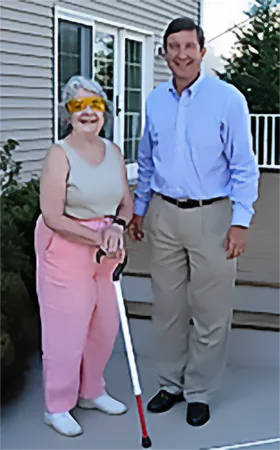Tips to Help Others Understand Your Vision Problems
My family wants to help me, but they’re doing too much!
 Author Ed Henkler
Author Ed Henkler
and his mother, Jane
When deciding what kinds of help and support you need, it’s helpful to begin by listing the day-to-day difficulties you’re having. Make a note of which problems are—and are not—related to your vision changes:
- Which tasks can you still do independently?
- Which tasks can you do independently but with difficulty?
- Which tasks require some assistance?
- Which tasks are you no longer able to do?
Be sure to include your family members and friends and ask if they have additional concerns or observations.
When discussing how to cope with vision changes, it’s important that you talk about your fears and feelings and help your family and friends adjust to your blindness or low vision while maintaining your independence.
If your vision changes are recent, your family and friends may be fearful when you try to do daily living tasks independently, such as climbing stairs, preparing meals, or using household appliances and equipment. They may be overprotective or in “rescue mode,” regardless of the skills you can perform safely and independently.
Encourage your family to discuss their concerns with you, and ask them to hear your feelings and opinions about what support you might need in the near future.
Helping Your Family and Friends Adjust to Your Vision Changes
Here are some suggestions to help you begin a discussion with your family members and friends:
- Tell your family and friends how your blindness or low vision currently makes you feel. It would be understandable if you felt sadness, anger, vulnerability, or uncertainty in the early stages of your vision changes.
- Talk with someone you trust who knows you and cares for you. It’s important to share your feelings and for others to share their feelings. You can then address your combined concerns more directly.
- For example, it might help both you and your family if you discussed the day-to-day activities that you believe you can manage on your own or with minimal help and which activities will require some assistance.
At first, you may have to keep reminding your family members and friends about your capabilities and lifetime of experience. Remember, too, that it may be difficult for them to “let go” without feeling hurt or rejected. But by sharing your understandable concerns, you may be able to create opportunities to seek possible solutions together.
It also helps if you take the time to explain why you can see better on some days than on others; for example, perhaps you see better on cloudy days because the glare from the sun can temporarily “blind” you and affect your ability to function.
If you have age-related macular degeneration (AMD), it’s helpful to explain that while you can’t see faces because of problems with your central (or straight ahead) vision, you can still walk outdoors safely because your peripheral (or side) vision is still intact and useful.
Ways to Reach Out for Support and Services
- You may find sharing your feelings with a close family member or friend, a professional counselor, a family doctor, or a religious or spiritual leader helpful.
- Reach out to a blindness or low vision support group. Support groups offer the opportunity to talk to others; share common concerns, frustrations, and stories; and find solutions to your vision-related difficulties.
- Speak with a professional staff member at a local vision rehabilitation agency. Learn more about the wide range of vision rehabilitation professionals and services available to help you.